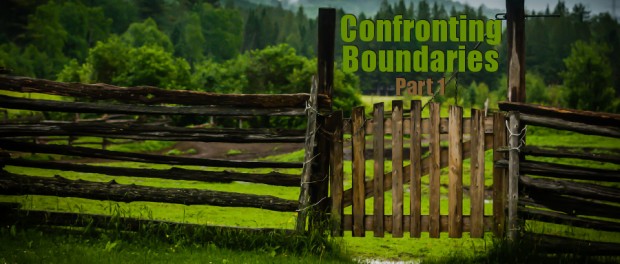Confronting Boundaries — Part 1

I recently wrote about my recognition that some boundaries aren’t as universally absolute as some Christians believe. Murder is wrong across the board, but can the same be said for listening to secular (non-Christian) music or wearing white after Labor Day?
James 4:17 tells us there is a relative component to sin in some cases. We’re accountable for what we know to be right and wrong, even if it’s something that’s not explicitly stated in the Bible. After all, we Christians have the Holy Spirit dwelling inside us. Therefore, we must be certain the boundaries we set and follow in our own lives are based on spiritually sound truth.
So how do we confront these boundaries and trust their integrity? How do we see if we’re against women wearing pants or men viewing pornography because it’s the Holy Spirit convicting us or because of some other influence (culture, history, preference, or personal background)?
The Wesleyan Quadrilateral
Well, I personally treat my boundaries like I do truth and doctrine in general, borrowing from John Wesley’s “quadrangle” or “quadrilateral” which depicts a simple but systematic method for recognizing and delineating truth for doctrine or other purposes. Like establishing boundaries.
The four sides of Wesley’s quadrilateral are four sources of input which may be considered as voices to speak to the truth of anything we encounter in life. It’s a fairly universal principle, and I’ve found it to be reliable. I apply these four sources of input in a specific sequence reflecting their descending weight. I’ll cover the first two in this post.
Scripture
The Bible comes first when confronting a boundary. If the boundary is defined in the Bible, it stays.
As a believer in sola scriptura, or the doctrine of the absolute authority and utter infallibility of God’s Word, I believe the Bible comes first when confronting a boundary (or discerning any potential truth). If the boundary is defined in the Bible, it stays. Nothing gets to trump the Word of God.
That said, properly interpreting God’s word requires more than a quick scan for keywords. If a verse seems to establish a boundary and I intend to live by it, there are other things to consider.
First, I must look at the purpose of the writing. Not everything in the Scripture is instructional. For example, many books offer historical reference, or wisdom literature, and unless otherwise specified, these aren’t a set of commandments. These books are often instructive, but not instruction. These books shed some light on truth, for sure, but I can’t take any verse out of its context. Just because God commanded Abraham to sacrifice his son doesn’t mean I’m required to as well.
Second, I must look at the original language. I’m not fluent in Hebrew, Greek, or Aramaic. However, tools like lexicons (basically cross-language dictionaries) and Strong’s Exhaustive Concordance (which lists every word in the Bible and tells you the original word in the original language) make it possible for ignorant people like me to find answers.
Third, I’ve got to consider the verse in a holistic, not atomistic, manner. That is, I can’t take it out of the context of the whole of the Canon and expect it to stand and be interpreted on its own. If a verse seems to require a boundary that is counter to the rest of the Bible, I have to remember the whole Bible is infallible, without errors. So, I must consider the context, recognizing that I’m missing something; perhaps there are circumstantial considerations.
For example, Paul’s infamous requirement that women be silent in church, when considered with an atomistic approach, forbids women from almost any activity in church. They can’t teach, they can’t pray, they can’t sing, and they can’t serve in almost any other capacity. Yet we see prophetesses, disciples, and other female speakers and leaders clearly depicted in the New Testament, including Paul’s own writings. Clearly, there are extenuating circumstances.
Rightly dividing the word requires effort, to which America is often allergic. Nevertheless, it’s the essential foundation of doctrine, and it gets to trump all three other sides of the quadrilateral. After all, the Holy Spirit won’t conflict His own Word.
Reason
If Scripture remains silent on a topic, or if apparent conflicts arise requiring interpretation, it’s time to fall back on the second side of Wesley’s quadrilateral: our reason.
I believe God gave us mental faculties because he intends us to use them. Unfortunately, America is often allergic to this, too. Or they confuse emotion with reason, which is often worse. Still, rational, critical thinking is invaluable for determining truth and boundaries that cannot be sufficiently quantified or qualified by Scripture alone.
So, thinking logically, does this boundary make sense? With the information on-hand, what is the rational thing to do?
Let’s explore a classic example. We see Scripture doesn’t forbid drinking, only drunkenness. You’ve got no clear scriptural answer about whether drink number two or drink number three is wrong. Now, your reason kicks in. You’ve had problems with addiction in the past. Or you still have to drive home in an hour. Or you’re home alone with four children. Perhaps your boundary in this situation should be more aggressive than the Bible’s mere prohibition on drunkenness.
Reason, applied properly, can equip us to set proper and healthy boundaries.
Keep in mind: we’re in a fallen state. So our reason is inherently suspect. That’s why reason doesn’t get to override the Bible. It’s infallible, and we’re very much not. However, God gave us the capacity to reason for a reason.
Two Sides
The first two sides of Wesley’s quadrilateral offer a great start for recognizing truth in any context, and that include the establishing, reassessing, and otherwise confrontation our boundaries. But what if both reason and the Word are silent? What’s the next step?
Read on to find out.
Originally posted 2015-02-27 08:00:45.


Leave a Reply